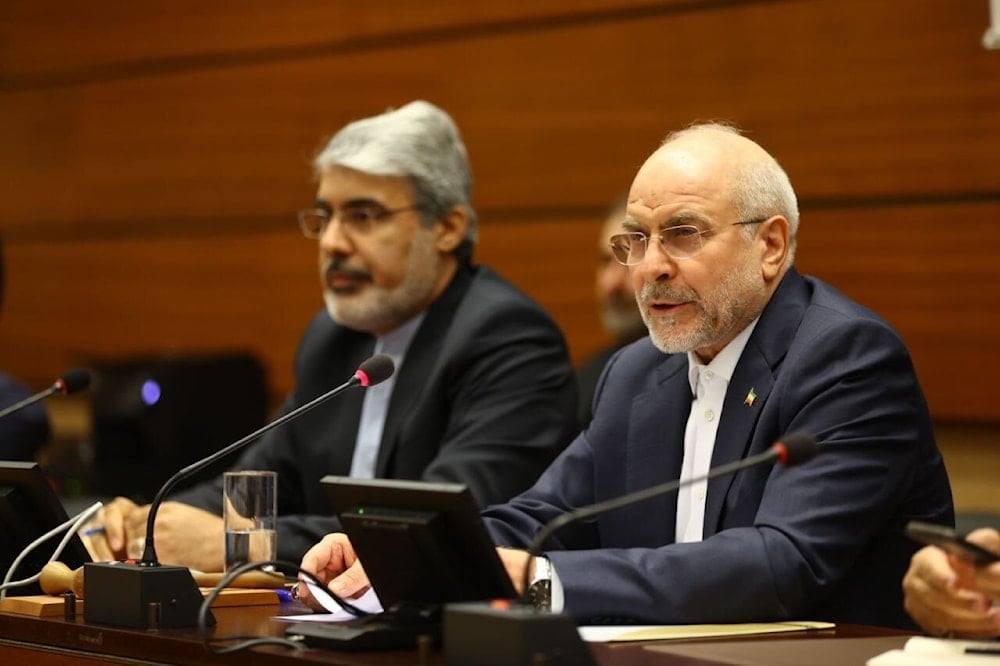Ghalibaf calls Snapback Mechanism illegal, warns of reciprocal actions
Iran’s Speaker slams the reimposition of sanctions on Iran as “illegal”, warning of reciprocal action, and stressing missile power and unity as key to national security.
-

Iranian Speaker Mohammad Bagher Ghalibaf at the UN meeting in Geneva on upholding international law and the UN Charter, joined by 31 delegations and 3 organizations, July 29, 2025. (X/ @mb_ghalibaf)
Iranian Parliament Speaker Mohammad Bagher Ghalibaf said during a public session of the chamber on Sunday that activating the snapback mechanism and reimposing sanctions is “illegal”.
Ghalibaf noted that the sanctions outlined in these resolutions are not significantly important compared to the US sanctions, warning that any country seeking to take action against Iran based on these resolutions will face an equivalent Iranian response. He also pointed out that Tehran does not see itself as obligated to comply with these “illegal” resolutions, including the suspension of uranium enrichment.
As for negotiations, Ghalibaf said that for Western countries, they equal “deception and pressure,” aimed at stripping Iran of its missile power.
Ghalibaf said that the key factor in protecting Iran’s national interests and security is possessing power, adding that the only way to deter the enemy from attacking is to strengthen the elements of power, especially by enhancing defensive capabilities and maintaining national unity.
Sayyed Hassan Nasrallah strengthened the idea of resistance
On the topic of martyr Sayyed Hassan Nasrallah, the Iranian Parliament Speaker said that Sayyed Nasrallah spent his life as a brave fighter for Palestine and for the security of the Lebanese people while confronting Zionist illusions.
He said that the martyred Sayyed Hassan Nasrallah drove the Zionist enemy out of Lebanon and strengthened the idea of resistance across the Islamic world, emphasizing that he remains in the hearts of young people resisting arrogance and Zionism.
Ghalibaf's statement comes after the United Nations imposed sanctions against Iran as part of the Snapback Mechanism, triggered by the E3 countries, France, Britain, and Germany, despite Iran engaging in talks with the countries.
Iran faces widespread sanctions after nuclear talks falter
On September 27, United Nations sanctions against Iran came back into effect for the first time in a decade after the breakdown of last-minute nuclear talks and a failed effort by Russia and China to postpone the measures.
France, Germany, and the United Kingdom triggered the snapback mechanism in UN Security Council Resolution 2231 by declaring Iran to be in significant non-performance of its nuclear commitments, which resulted in the restrictions taking effect.
These sanctions prohibit dealings related to Iran’s nuclear and ballistic missile programs, reimpose conventional arms embargoes, and reinstate travel bans and asset freezes on listed individuals and entities.
The E3 foreign ministers emphasized in a joint statement that their goal remains ensuring Iran never acquires a nuclear weapon, explaining that reinstating the sanctions was a measure of last resort necessitated by Iran's persistent violation of its JCPOA commitments.
Contrary to the E3's claims, Iran had remained compliant with the JCPOA even after the United States unilaterally withdrew from the agreement, but began to scale back following the E3's failure to comply with their commitments.

 3 Min Read
3 Min Read








